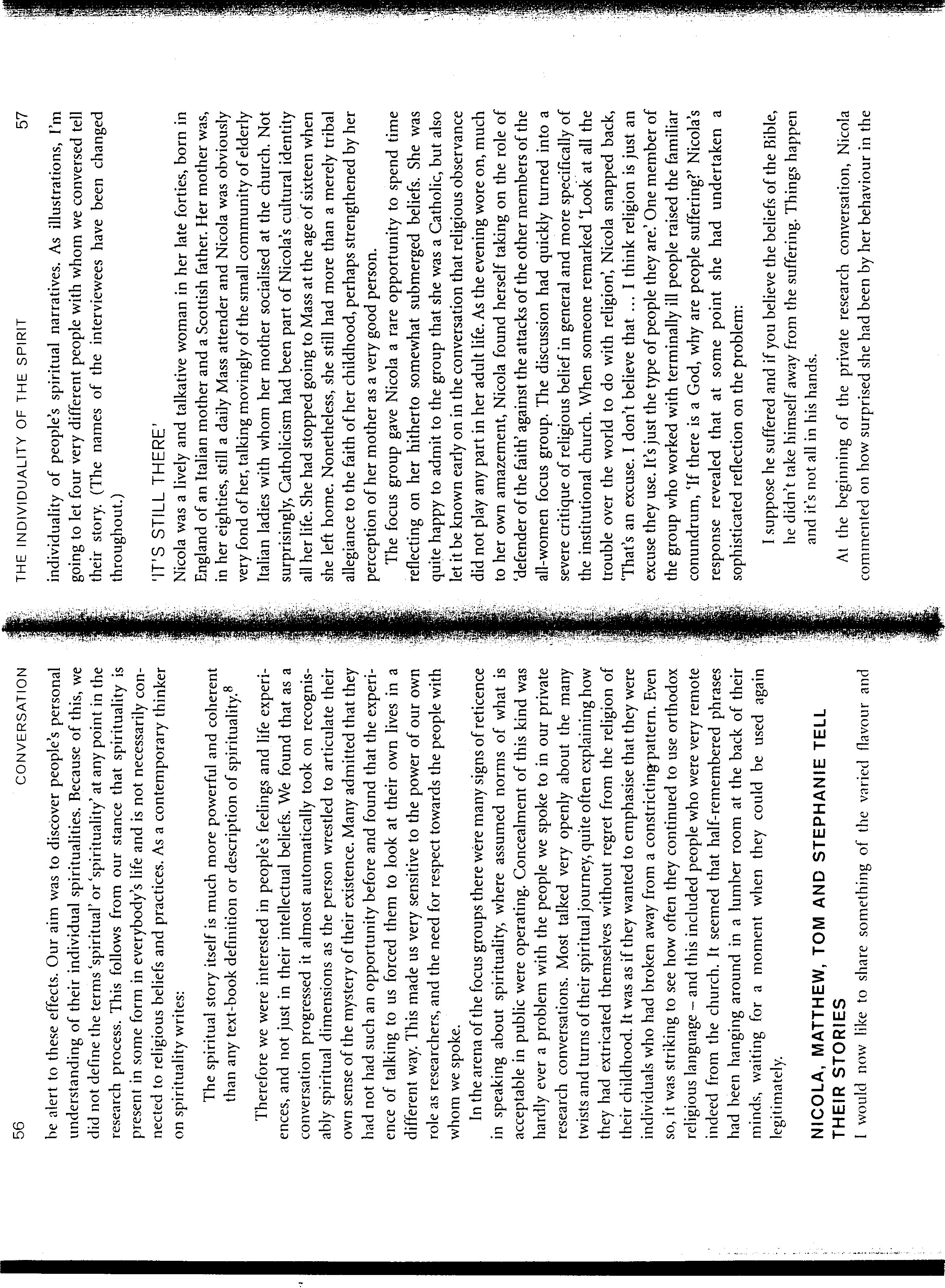87426 ScannedImage 3

56 CONVERSATION
be alert to these effects. Our aim was to discóver peoples personal understanding of their individual spiritualities. Because of this, we did not define the terms ‘spiritual’ or ‘spirituality’ at any point in the research process. This follows from our stance that spirituality is present in some form in everybody’s life and is not necessarily con-nected to religious beliefs and practices. As a contemporary thinker on spirituality writes:
The spiritual story itself is much morę powerful and coherent
than any text-book definition or description of spirituality.8
Therefore we were interested in peoples feelings and life experi-ences, and not just in their intellectual beliefs. We found that as a conversation progressed it almost automatically took on recognis-ably spiritual dimensions as the person wrestled to articulate their own sense of the mystery of their existence. Many admitted that they had not had such an opportunity before and found that the experi-ence of talking to us forced them to look at their own lives in a different way. This madę us very sensitive to the power of our own role as researchers, and the need for respect towards the people with whom we spoke.
In the arena of the focus groups there were many signs of reticence in speaking about spirituality, where assumed norms of what is acceptable in public were operating. Concealment of this kind was hardly ever a problem with the people we spoke to in our private research conversations. Most talked very openly about the many twists and turns of their spiritual journey, quite often explaining how they had extricated themselves without regret from the religion of their childhood. It was as if they wanted to emphasise that they were individuals who had broken away from a constricting pattern. Even so, it was striking to see how often they continued to use orthodox religious language - and this included people who were very remote indeed from the church. It seemed that half-remembered phrases had been hanging around in a lumber room at the back of their minds, waiting for a moment when they could be used again legitimately.
NICOLA, MATTHEW, TOM AND STEPHANIE TELL THEIR STORIES
I would now like to share something of the varied flavour and
individuality of peoples spiritual narratives. As illustrations, I’m going to let four very different people with whom we conversed tell their story. (The names of the interviewees have been changed throughout.)
'IT'S STILL THERE’
Nicola was a lively and talkative woman in her late forties, born in England of an Italian inother and a Scottish father. Her mother was, in her eighties, still a daily Mass attender and Nicola was obvious!y very fond of her, talking movingly of the smali community of elderly Italian ladies with whom her mother socialised at the chtlrch. Not surprisingly, Catholicism had been part of Nicolas cultural identity all her life. She had stopped going to Mass at the age of sixteen when she left home. Nonetheless, she still had morę than a merely tribal allegiance to the faith of her childhood, perhaps strengthened by her perception of her mother as a very good person.
The focus group gave Nicola a rare opportunity to spend time reflecting on her hitherto somewhat submerged beliefs. She was quite happy to admit to the group that she was a Catholic, but also let it be known early on in the conversation that religious observance did not play any part in her adult life. As the evening wore on, much to her own amazement, Nicola found herself taking on the role of ‘defender of the faith’ against the attacks of the other members of the all-women focus group. The discussion had ąuickly turned into a severe critique of religious belief in generał and morę specifically of the institutional church. When someone remarked ‘Look at all the trouble over the world to do with religion’, Nicola snapped back, ‘Thats an excuse. I dont believe that ... I think religion is just an excuse they use. It’s just the type of people they are.’ One member of the group who worked with terminally ill people raised the familiar conundrum, Tf there is a God, why are people suffering?’ Nicola’s response revealed that at some point she had undertaken a sophisticated reflection on the problem:
I suppose he suffered and if you believe the beliefs of the Bibie, he didn’t take himself away from the suffering. Things happen and it’s not all in his hands.
At the beginning of the private research conversation, Nicola commented on how surprised she had been by her behaviour in the
Wyszukiwarka
Podobne podstrony:
ScannedImage 3 56 CONVERSATION be alert to these effects. Our aim was to discóver peoples personal u
ScannedImage 6 62 CONVERSATION we need to cling on to certain private certainties, and ... certainti
00234 ?35b630d34288277a734379e56dd94a 236Basley (actual) sigma of .369. There is seen to be opportu
Two buildings on the London campus of a the TestKing Corporation must be connected to use Ethernet w
Tape deck, any age, must be up to hi-fi standard* and of reliable manufactura and design, pręt but n
- 4 - estimated that natural regeneration will not be able to satisfy the fuelwood needs of the citi
8 1 (i.e., those with m/z >250) can be attributed to somewhat heavier oxygen derivatives of diter
54033 str (115) 5° RELAXATION eąuation. For further details, reference should be madę to Hatschek s
38 (239) 38 CORRECTJONS TO BE APPLIED TO THE OBSERVEL> AJ.T1TUDE OF SM StU
TEACHER/LECTURER NOTES Aim This unit is designed to develop knowledge and understanding of Computer
angielski0001 •y 1 Before you read In Brltaln, it’s common to categorise people in lots of dlff
ScannedImage 9 68 CONVERSATION freely, and talking about a religious experience? I he issue seems to
May 6th 2020 marked eight weeks sińce the WHO declared the COVID-19 outbreak to be a pandemie. Over
więcej podobnych podstron